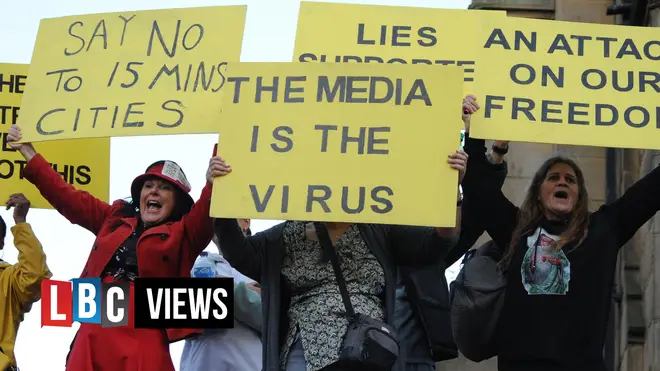
Paul Brand 10am - 12pm
3 October 2023, 13:27

For the past eighteen months or so, around a dozen protestors have lined the streets of my local neighbourhood every Sunday afternoon, waving placards spouting dangerous conspiracy theories about the safety of the Covid-19 vaccine and the debunked idea of 5G masts amplifying the disease's spread.
Recently, however, the group has expanded its horizons beyond Covid, taking aim at other "schemes" which have the apparent goal of instilling Orwellian levels of social control.
Arguably the most ludicrous of these theories relates to the concept of 15-minute cities. Essentially a form of town planning, the idea promotes the provision of essential local services - whether it be shops, GP centres or schools - within a fifteen-minute walk or cycle.
Aside from the obvious extra convenience for residents, councils such as Bristol and Canterbury have used the policy to inform traffic-calming measures and air quality objectives, as the reduced need for cars should result in a decline in pollution.
Conspiracists, though, baselessly claim that it is a means of restricting choice, fencing people within their local community and stifling travel - a plot overseen by the World Economic Forum to exercise total control over our lives.
And now they have an ally in Transport Secretary Mark Harper.
Yesterday, Mr Harper took to the stage at the Tory Conference to decry the "sinister" use of 15-minute cities, arguing that "what we shouldn't tolerate is the idea that local councils can decide how often you go to the shops and that they ration who uses the roads and when, and they police it all with CCTV."
Nor was this attack a throwaway remark. In the Department for Transport's "Plan for Cities," 15-minute cities, with their objective of "polic[ing] people's lives," feature no less than four times.
But is there not a single council across the country who are using - or have even proposed to use - 15-minute cities for this purpose? So why is the Transport Secretary giving this oxygen?
Clearly, the Tories see political capital to be exploited through the challenges facing drivers, applying the lessons from the Uxbridge by-election, where anti-ULEZ feeling propelled Steve Tuckwell to victory. Rishi Sunak has repeatedly asserted he is "on the motorist's side" in recent days, launching a crusade against 20 mph zones in the process.
Whilst legitimate debates exist over the conditions facing drivers, broadening this frontier to include 15-minute cities appeals almost exclusively to those promoting conspiracy theories.
Taking to the airwaves later in the day, Andrew Bowie, a minister at the department for Energy and Net Zero, defended Mr. Harper, saying that this issue "was coming up on doorsteps across the country and forums online."
Parking my scepticism of how often the theoretical risk of state control posed by 15-minute cities is popping up on the doorstep - especially in the midst of a cost-of-living crisis and key services under unprecedented stress - should the government really be concerning itself with online forums that are propagating such rubbish?
It could be argued, using this rationale, the government needs to formulate a position to allay people's fears about the QAnon conspiracy, which states there is a Satanic cabal, headed by a legion of world leaders, operating an underground child molestation ring.
Yet, while the QAnon theory is patently absurd, it has grown in stature in the United States precisely because political figures there have given it some legitimacy.
The reality is, by flirting with conspiracists over 15-minute cities, the Transport Secretary risks doing the same.